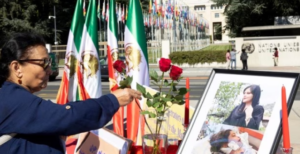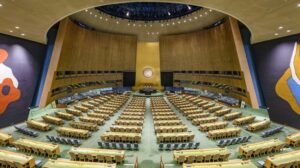Mahsa Amini’s untimely demise in 2022 while in Iranian police custody, allegedly for violating headscarf regulations, sparked nationwide outrage and unprecedented protests. The United Nations, through a fact-finding mission, has unveiled damning evidence attributing Amini’s death to Iran’s security forces.
Mahsa Amini’s tragic death serves as a focal point for the UN’s scrutiny of Iran’s human rights record. The UN fact-finding mission concluded that Amini’s demise was the result of “physical violence” inflicted by Iranian security forces during her detention. Amini, aged 22, was arrested for alleged headscarf violations and subsequently died in police custody.
The UN report also shed light on the excessive use of force by Iranian security forces against protesters following Amini’s death, leading to numerous casualties. Despite Iran’s denial of responsibility, the UN’s findings present a stark indictment of the government’s actions and raise significant concerns about human rights violations in the country.
Inciting Nationwide Protests
 Mahsa Amini’s death ignited widespread protests across Iran, transcending her hometown of Saqqez and reverberating throughout the nation.
Mahsa Amini’s death ignited widespread protests across Iran, transcending her hometown of Saqqez and reverberating throughout the nation.
Citizens, outraged by the injustice of Mahsa Amini’s treatment and emboldened by longstanding grievances, took to the streets to demand accountability and reform.
Women played a prominent role in the protests, symbolizing their resistance by discarding their hijabs—a potent gesture against oppressive dress codes.
The demonstrations rapidly gained momentum, with participants calling for systemic change and an end to government-sanctioned human rights abuses. Mahsa Amini’s death, therefore, served as a catalyst for a broader movement demanding justice and fundamental rights.
Violent Crackdown and Human Rights Violations
 The UN report meticulously documented the violent crackdown unleashed by Iranian security forces in response to the protests.
The UN report meticulously documented the violent crackdown unleashed by Iranian security forces in response to the protests.
Security personnel resorted to disproportionate and lethal force, using firearms to suppress dissent and quash demonstrations.
Shockingly, deliberate targeting of protesters’ eyes with firearms resulted in permanent injuries and fatalities.
Moreover, the report exposed rampant sexual violence perpetrated against protesters, particularly women, as a means of intimidation and control. Instances of rape, threats of rape, and other forms of sexual abuse were reported, highlighting the systematic nature of human rights violations perpetrated by Iranian authorities. These egregious acts underscored the government’s flagrant disregard for basic human rights and the rule of law.
Impact of Mahsa Amini’s death
Despite the damning revelations of the UN report, analysts remain skeptical about its potential to catalyse meaningful change within Iran’s conservative-dominated political landscape. Recent elections characterized by low voter turnout suggest widespread disillusionment with the political establishment and limited prospects for reform from within.
While the UN’s findings may garner international condemnation and scrutiny, their impact on domestic policies and governance structures in Iran remains uncertain. Nevertheless, the report serves as a poignant reminder of the ongoing struggle for freedom, equality, and justice within the country.
It underscores the urgent need for the Iranian authorities to halt repression, uphold human rights standards, and be held accountable for their actions on the global stage.
Mahsa Amini’s tragic death and the subsequent revelations from the UN report cast a glaring spotlight on the egregious human rights violations perpetrated by Iranian authorities. The findings of the fact-finding mission underscore not only the systemic abuses within Iran’s judicial and security apparatus but also the urgent need for accountability and justice.
While the UN report serves as a critical step towards shedding light on the injustices suffered by Mahsa Amini and countless others, its impact on effecting tangible change within Iran remains uncertain. The conservative-dominated political landscape, coupled with entrenched power structures, presents formidable obstacles to reform efforts from within.
 However, the international community must not waver in its commitment to upholding human rights and promoting accountability.
However, the international community must not waver in its commitment to upholding human rights and promoting accountability.
Continued advocacy, diplomatic pressure, and scrutiny are essential to hold Iran accountable for its actions and to ensure that perpetrators of human rights violations are brought to justice.
Moreover, the UN report serves as a rallying cry for solidarity with the Iranian people, who bravely defy repression and demand dignity, freedom, and justice. Their resilience in the face of adversity inspires hope and underscores the universal quest for human rights and dignity.
As the world bears witness to the plight of individuals like Mahsa Amini, it must stand united in condemning injustice and advocating for a future where human rights are respected, upheld, and protected for all.
Only through collective action and unwavering commitment can the aspirations of the oppressed be realized, and meaningful change be achieved in Iran and beyond.
ALSO READ: Despite Hunt’s NI cut in UK budget, taxes set to peak at highest since 1948










Comments 1